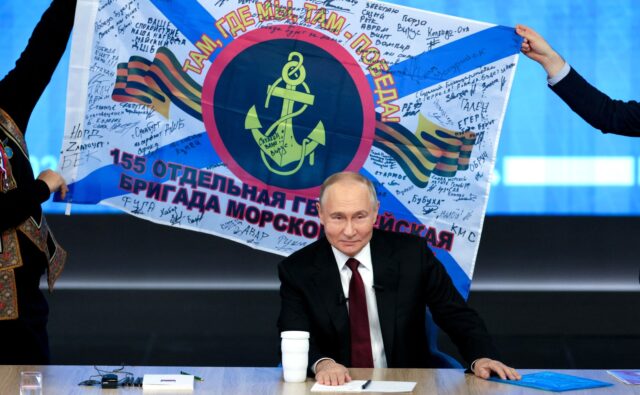
Russia Balances War Escalation and Negotiations Rhetoric Amid Growing Discontent
Publication: Eurasia Daily Monitor Volume: 22 Issue: 1
By:

Executive Summary:
- Typically “hawkish” Russian media outlets have recently expressed hope for negotiations to end the war in Ukraine. Skepticism remains, however, with independent analysts citing Russia’s battlefield momentum and potential military escalation in Ukraine.
- Many Russian soldiers and civilians desire an end to the war, but fear of betrayal and defeat fuels them to continue the war. Public opinion shows that many Russians favor peace, but pro-Putin sentiments dominate, limiting anti-war influence.
- Putin and radical propagandists push for escalation, including missile provocations and new offensives, dismissing peace efforts. Distrust of negotiations and paranoia fuel their belief in a decisive military victory.
At the end of 2024, many Russian media outlets that had previously held “hawkish” positions about the war in Ukraine unexpectedly started to publish “dovish” articles, expressing hope for a negotiated end to the war. Writers at the outlet Military Review, a publication closely associated with the Russian Ministry of Defense (MoD), published that the likelihood of a confrontation between Russia and the North Atlantic Treaty Organization (NATO) was low, and rather than a military victory, the conflict will likely end with negotiations (Topwar.ru, November 23). They also began to propose responding to emerging threats without using nuclear strategy. Independent analysts, however, doubt that the war could end with a peace agreement anytime soon. Military analyst Ivan Lysyuk suggests that U.S. President-elect Donald Trump lacks effective levers to influence Russia, which has the initiative on the battlefield, signaling that Moscow will likely continue the attack unless Ukraine agrees to all of Russia’s demands. Citing Ukrainian officials, Lysyuk notes signs that the Russian command is preparing to scale up military operations in the Zaporizhzhia and Kherson oblasts (Vot-tak.tv, December 18). Researcher and journalist Konstantin Skorkin notes that former Syrian President Bashar al-Assad’s example has shown the Kremlin that “any truce [without the final defeat of the enemy] only leads to the enemy accumulating forces and carrying out revenge at a convenient moment” (Vot-tak.tv, December 12). This has probably increased Russian President Vladimir Putin’s and Kremlin hawks’ paranoia about the state of the war and what is needed to end it.
Putin’s conduct at the end of 2024 was also quite provocative. Within the “Year in Review” press release published at the end of 2024, Putin proposed holding a “high-tech duel” with the West. Russia would choose a target in Kyiv to strike with an “Oreshnik” missile to test the effectiveness of the West’s air and missile defenses (Vzglyad, December 19). Radical-patriotic propagandists at the Tsargrad TV channel are not slowing down either, claiming that even if the “special military operation” (SVO) ends with the “liberation” of four Ukrainian regions, Moscow would have to immediately thereafter begin “SVO-2” to finally “eliminate the Ukrainian threat” (Тsargrad.tv, December 16). Russian military analysts, who a month earlier advocated for negotiations, began to have doubts following Ukraine’s assassination of high-ranking Russian General Igor Kirillov in Moscow in mid-December. Military Review describes the incident as a terrorist act and an act of “sophisticated propaganda,” rhetoric that will create fear among the Russian people. The propaganda disguised as analysis published in Military Review hides the true inclinations of Russian military sources, eliciting more concern (Topwar.ru, December 19).
Correspondents for the independent Verstka outlet report that rumors about the imminent start of negotiations to end the war in Ukraine could cause concern for Russian troops. Despite the general desire to leave the trenches and return home to their families, they worry that over time, Ukrainian forces will return to the offensive. They also worry that Ukraine will “be successful in some places,” and Russia will be “betrayed as it was in Syria.” The fear of defeat and the desire for revenge are the fundamental motives for continuing the war to a victorious conclusion (Verstka, December 12). Sex workers traveling from Moscow to Donbas, profiting from the large salaries of military personnel, note that many soldiers feel guilty for their comrades’ deaths and regret that they “have to do the dirty work.” The soldiers would like to return home, but many already consider themselves “casualties” and, therefore, believe that all they can do is finish what they started (Verstka, December 10). Such an aggressive sense of doom contrasts with the attitude of most of Russian society. According to data from the Russian Field Sociological Service, in mid-November 2024, 60 percent of Russians favored an agreement to end the war, and only 30 percent favored continuing it (Тelegram/russian_field_soc, December 10).
It is nearly impossible to hope that public attitudes will influence Putin to end his war. Russian opposition politician Yulia Galyamina explains that anti-war discourse in dissident circles has been divided between the “radical pro-Ukrainian” base, whose focus is the interests of Ukraine, and the “pro-Russian anti-Putin” base, whose main priority is the fate of Russia and its citizens. Simultaneously, she points out that most of Russian society adheres to “pro-Putin pacifism,” that is, they advocate for an end to military action but do not oppose Putin and the Kremlin. Galyamina notes that “this discourse of the passive majority is practically not represented publicly and does not have authoritative defenders and speakers in the media space” (Re-Russia.net, October 3). These conclusions about the passive majority are confirmed by sociological data collected by the Levada Center, which shows that a vast majority of people support Putin’s actions, especially those who get their information from television (Levada.ru, November 1).
It is difficult to imagine a quick end to Russia’s war for the time being. Without the proper leverage to sway Putin in negotiations, he will continue to strive for a military victory. Despite the everyday discontent of Russians with the war, there will probably be no anti-government demonstrations. At the same time, the supporters of the war’s voices are louder and have become the main base on which the Russian government relies.



